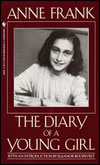
Anne Frank: Diary of a Young Girl
By Anne Frank
I read this book when I was ten and cried my eyes out when I finished it. Our housekeeper, a German woman, asked what was wrong. I said, "This is so terrible—all these people," and she said, "Oh no, they are lying. Many more Germans died than Jews. Only 600,000 Jews died, not six million." It was a real wake-up call—proof that some people rewrite history—and a lesson about how we must be vigilant in remembering events like this one. In college, I wrote my thesis about racial conflict in China between Chinese and African students. And I worked on Freedom to Hate, a documentary about neo-Nazi, anti-Semitic hate groups in Russia. More recently, I was in The Grey Zone, a film about the revolt of prisoners at Auschwitz, by Tim Blake Nelson. I have to attribute my interest in crimes of hatred to this book.
By Anne Frank
I read this book when I was ten and cried my eyes out when I finished it. Our housekeeper, a German woman, asked what was wrong. I said, "This is so terrible—all these people," and she said, "Oh no, they are lying. Many more Germans died than Jews. Only 600,000 Jews died, not six million." It was a real wake-up call—proof that some people rewrite history—and a lesson about how we must be vigilant in remembering events like this one. In college, I wrote my thesis about racial conflict in China between Chinese and African students. And I worked on Freedom to Hate, a documentary about neo-Nazi, anti-Semitic hate groups in Russia. More recently, I was in The Grey Zone, a film about the revolt of prisoners at Auschwitz, by Tim Blake Nelson. I have to attribute my interest in crimes of hatred to this book.
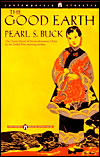
The Good Earth
An Oprah's Book Club selection By Pearl S. Buck
I was captivated both by the atmosphere and imagery of traditional China evoked in this novel—it was the beginning of my fascination with Chinese culture. I was twelve when I read this, and my very good friend was Angela Wang. Her family would take me with them to Chinatown to see the Peking Opera and to Chinese New Year's celebrations. When I got to college, I chose Chinese studies as my major, and after I graduated I lived in China. Like Anne Frank's diary, this book influenced so many decisions I made later on.
An Oprah's Book Club selection By Pearl S. Buck
I was captivated both by the atmosphere and imagery of traditional China evoked in this novel—it was the beginning of my fascination with Chinese culture. I was twelve when I read this, and my very good friend was Angela Wang. Her family would take me with them to Chinatown to see the Peking Opera and to Chinese New Year's celebrations. When I got to college, I chose Chinese studies as my major, and after I graduated I lived in China. Like Anne Frank's diary, this book influenced so many decisions I made later on.
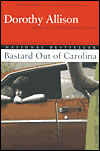
Bastard Out of Carolina
By Dorothy Allison
I've always felt there were many seminal coming-of-age stories about young boys, but no one great American novel about a young girl's—until I read this book. It follows Ruth Anne Boatwright's struggle to become a young woman, to find her place within the large Boatwright family, and to deal with her increasingly abusive stepfather. I loved Carson McCullers's The Member of the Wedding, but I felt that this story was stronger and deeper and rougher and truer. It's just a brilliant novel.
By Dorothy Allison
I've always felt there were many seminal coming-of-age stories about young boys, but no one great American novel about a young girl's—until I read this book. It follows Ruth Anne Boatwright's struggle to become a young woman, to find her place within the large Boatwright family, and to deal with her increasingly abusive stepfather. I loved Carson McCullers's The Member of the Wedding, but I felt that this story was stronger and deeper and rougher and truer. It's just a brilliant novel.
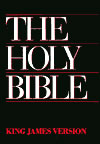
The New Testament
My mother is a very religious person, and I first read much of the New Testament with her when I was a girl. Its inspirational parts, especially the passages about love, give me strength and a desire for goodness that I don't find in much of our modern world.
My mother is a very religious person, and I first read much of the New Testament with her when I was a girl. Its inspirational parts, especially the passages about love, give me strength and a desire for goodness that I don't find in much of our modern world.
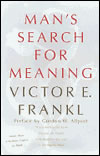
Man's Search for Meaning
By Viktor E. Frankl
The director Tim Blake Nelson had me read this book as part of my preparation for The Grey Zone. Frankl, who survived Auschwitz, writes that human beings want meaning in their lives. He argues that those at Auschwitz who had something to live for—a person they loved or an ideal or a cause they could dedicate their behavior to—were better able to survive in the camps. He suggests there is a way to be an exemplary human being even in the face of an awful fate that one cannot change. I tried to give that feeling to my character—a woman who is helping smuggle gunpowder out of the factory where she's working to other rebels among the inmates at Auschwitz. (Their efforts result in the destruction of one of the crematoriums.) She has dedicated her life to the cause of trying to slow down the machinery of death, and she's willing to die for it.
By Viktor E. Frankl
The director Tim Blake Nelson had me read this book as part of my preparation for The Grey Zone. Frankl, who survived Auschwitz, writes that human beings want meaning in their lives. He argues that those at Auschwitz who had something to live for—a person they loved or an ideal or a cause they could dedicate their behavior to—were better able to survive in the camps. He suggests there is a way to be an exemplary human being even in the face of an awful fate that one cannot change. I tried to give that feeling to my character—a woman who is helping smuggle gunpowder out of the factory where she's working to other rebels among the inmates at Auschwitz. (Their efforts result in the destruction of one of the crematoriums.) She has dedicated her life to the cause of trying to slow down the machinery of death, and she's willing to die for it.
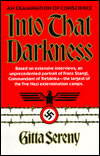
Into That Darkness
By Gitta Sereny
In 1971, Sereny interviewed Nazi Franz Stangl in an attempt to understand how a man could go from being a master weaver to the commandant of two death camps. The most important thing for me was how clearly his life proves that at every point a person has a choice. If he had said, "No, I will not be party to this," he might have been punished, demoted, or even killed. But at the end of his life, he admitted it would have been better to die than to have ended up where he did. It's a story about actively living by your principles and about that certain point when you have to make an absolute moral choice. Stangl was never willing to do that. Not even once.
By Gitta Sereny
In 1971, Sereny interviewed Nazi Franz Stangl in an attempt to understand how a man could go from being a master weaver to the commandant of two death camps. The most important thing for me was how clearly his life proves that at every point a person has a choice. If he had said, "No, I will not be party to this," he might have been punished, demoted, or even killed. But at the end of his life, he admitted it would have been better to die than to have ended up where he did. It's a story about actively living by your principles and about that certain point when you have to make an absolute moral choice. Stangl was never willing to do that. Not even once.
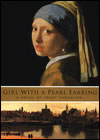
Girl with a Pearl Earring
By Tracy Chevalier
I've come to love the visual arts. Whenever I travel, I visit the museums. I found this fictionalized account of a servant in painter Johannes Vermeer's household fascinating, especially in how it explores the power, not of the artist but of the subject of a painting. The sitter, a young maid, is the person we all have our eyes on, and even though the painter is pulling the strings—determining the pose and costume and composition—her humanity is undeniable. It's so strong, in fact, that the writer was able to create a whole story about this unknown girl.
By Tracy Chevalier
I've come to love the visual arts. Whenever I travel, I visit the museums. I found this fictionalized account of a servant in painter Johannes Vermeer's household fascinating, especially in how it explores the power, not of the artist but of the subject of a painting. The sitter, a young maid, is the person we all have our eyes on, and even though the painter is pulling the strings—determining the pose and costume and composition—her humanity is undeniable. It's so strong, in fact, that the writer was able to create a whole story about this unknown girl.




